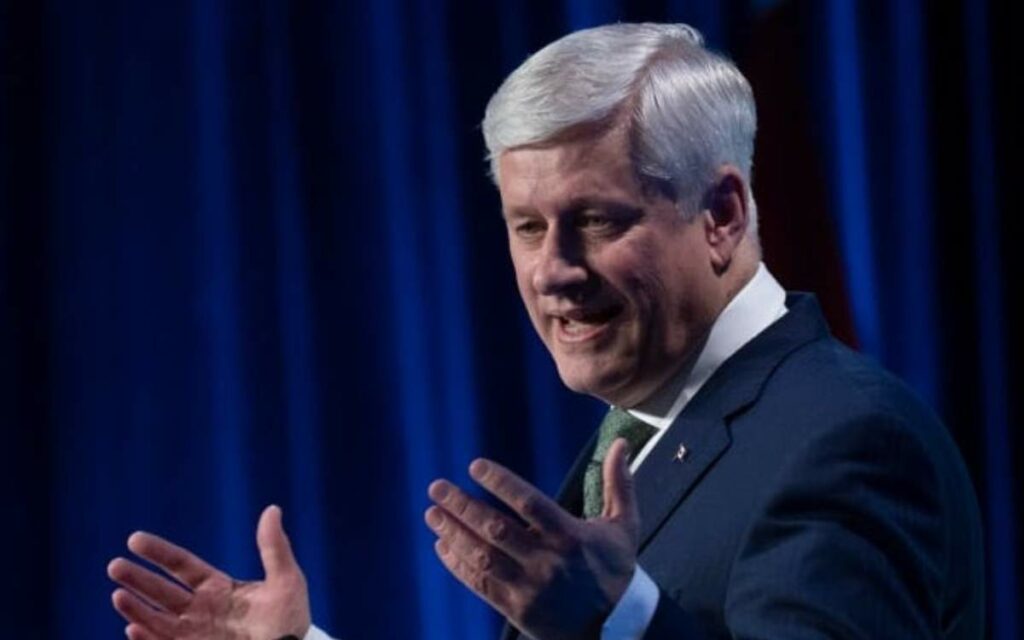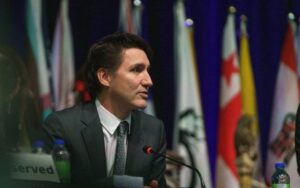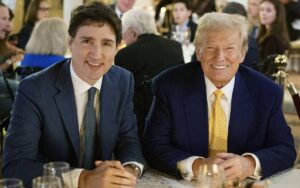
Former Prime Minister Stephen Harper delivered a keynote address at Canada Strong and Free’s annual networking conference on Wednesday. In the speech, he reviewed pivotal events in modern Canadian history through the lens of his own political career. Photo credit: The Canadian Press/Adrian Wyld
The annual Conference of the Canada Strong and Free Network (formerly the Manning Centre) took place this past week, hosting conservatives from across Canada. Quite a few conservative heavy hitters were in attendance, including former Prime Minister Stephen Harper, current Conservative party leader Pierre Poilievre and former Reform Party leader Preston Manning.
Harper’s keynote speech was particularly interesting, as he reviewed pivotal events in Canada through the lens of his own political career, starting with the election in 1993 of two effectively new federal political parties and the virtual decimation of the Progressive Conservative Party of the day. In that disruptive election, the Reform Party won 52 seats, the Bloc Quebecois 54 and the Liberals won a huge majority with 177 seats. That election was also the first time Harper was elected as a Member of Parliament.
Harper also noted how the basic principles of the Reform Party – balanced budgets, prioritizing the needs of middle- and working-class Canadians and small businesses and promotion of policies benefitting the family – were quite widely adopted by other parties, unlike today. Populism in its true definition, which is “a political approach that appeals to ordinary people who feel that their concerns are disregarded by established elite groups”, was also the order of the day.
Although the Liberal government under Jean Chretien and Paul Martin was the one that balanced the budget when Canada faced a severe financial crisis in the mid-1990s, the policies it implemented were very consistent with many conservative principles that Reform was espousing. For instance, in those days the Liberals did not disagree with the objective of a balanced budget, merely claimed the Conservatives favoured doing it too quickly. In contrast, the Liberals of today don’t seem to think balancing the budget has any value at all.
Harper cited the ways in which our current times in many ways are a repeat of the government of the first Trudeau, with big government spending, massive expansion of government size and cost, policy driven more by ideology than in response to what Canadians needed and the build-up of record federal government debt. That approach was not only pursued in Canada, and eventually brought about the conservative revolution championed by Reagan in the US, Thatcher in the UK, and Mulroney in Canada. Of those three countries, however, Canada was the only one which had such massive debt that it risked a serious financial meltdown.
Looking back at when Harper finally came into power in 2006, following yet another Liberal scandal, it was a pretty successful period for Canada despite the 2008 financial crisis we imported from the US. Harper balanced the budget several times despite downturns, cut almost 40 billion from the national debt, cut taxes, tightened up penalties on criminals and Canada outperformed other G7 countries in terms of economic stability and job creation.
His policies were much more friendly to the middle class and small business than today’s environment despite the current government claims to be helping the middle class. Sadly, virtually all those accomplishments have since been reversed by the Trudeau regime.
As the old saying goes, if we don’t know our history, we are doomed to repeat it. It is unfortunate that today’s education system does not prioritize teaching young people about these events, as it would be helpful for them to know that many of the negative economic events we are experiencing today – high inflation, increasing interest rates and high public debt levels – were all experienced in the past and necessitated a major change in policy direction.
Of course, the situation is not identical to that of the 1970s and 1980s, but there are many similarities. And history also suggests that the ascendance of another wave of conservative policies is imminent to clean up our current mess.

She has published numerous articles in journals, magazines & other media on issues such as free trade, finance, entrepreneurship & women business owners. Ms. Swift is a past President of the Empire Club of Canada, a former Director of the CD Howe Institute, the Canadian Youth Business Foundation, SOS Children’s Villages, past President of the International Small Business Congress and current Director of the Fraser Institute. She was cited in 2003 & 2012 as one of the most powerful women in Canada by the Women’s Executive Network & is a recipient of the Queen’s Silver & Gold Jubilee medals.




















